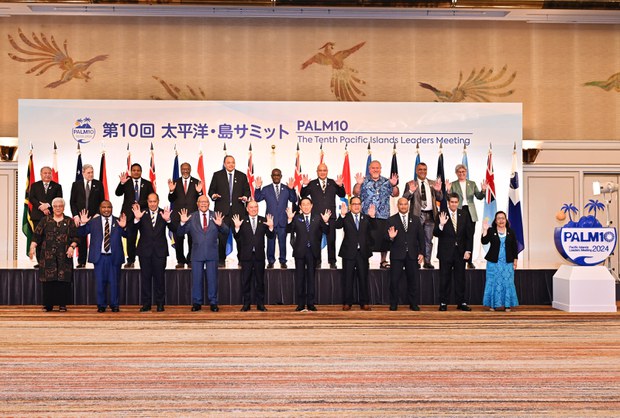
By Ednal Palmer
Prime Minister Jeremiah Manele remains skeptical at Japan’s release of treated radioactive wastewater into the Pacific Ocean and joined other Pacific Island leaders to express concern.
On arrival yesterday from the PALM 10 meeting after a State visit to China, Manele said the absence of national and regional scientific capability to fully understand the science and implications of the discharge has created a vacuum of uncertainty and unknowns for a country such as the Solomon Islands.
“Solomon Islands is a large ocean state with an area exceeding 1.5 million square kilometres, most of which is ocean,” Manele said.
“The ocean is past, our present and our future. Keeping the ocean healthy is a shared global responsibility,” he added.
Consensus has been reached during the 10th Pacific Island Leaders Meeting (PALM10) with Japan to address the controversial release of treated nuclear wastewater from the Fukushima nuclear power plant into the Pacific Ocean.
In August last year, Japan began discharging treatedwaste from about 1,000 storage tanks holding 1.34 million metric tons of contaminated water collected after an earthquake and tsunami in 2011 that caused the meltdown of the Fukushima nuclear plant.
Manele claimed since Japan began discharging nuclear treated water, the action has created much stress and anxiety amongst Solomon Islanders.
“Having regional and national verifiable scientific assessment will calm nerves.
“I also reminded the meeting that even natural disasters can threaten the peaceful use of nuclear energy as has been the case that had led to the discharge of ALPS treated water.”
Japan’s Prime Minister Fumio Kishida assured the PIF leaders the discharge was being conducted in compliance with international safety standards and practices.
He emphasised Japan’s commitment to ongoing collaboration with the International Atomic Energy Agency to ensure the process’ safety and transparency.
He assured Pacific Island Leaders of Japan’s multilateral commitment to assist the Pacific to build their scientific capacity and monitoring capability to assess health and well-being of marine ecosystem including human health as a response to the action.
Recently, Japan’s State Minister for Foreign Affairs, Horii Iwao, who visited Solomon Islands, said the discharge process has been carried out within the safety standards of IAEA (International Atomic Energy Agency).
He said many countries around the world have been releasing water containing radioactive tritium into the sea from their nuclear plants all these years.
“These are done within the safety standards of IAEA. So Japan is not the only country doing this,” Iwao said.
“In fact, China releases more tritium from its nuclear plants than what Japan is releasing from the Fukushima plant,” he added.
China has been the staunchest of opponents against the Japanese discharge. It had imposed an import ban on Japanese fish as a result.
But critics have accused Beijing of hypocrisy and of using the incident to whip up anti-Japanese sentiment.
Scientists have pointed out that China’s own nuclear power plants release wastewater with higher levels of tritium than that found in Fukushima’s discharge, and that the levels are all within boundaries not considered to be harmful to human health.
China’s Fuqing power plant in Fujian province, for example, releases about three times more tritium into the Pacific than the Fukushima discharge.
Beijing appears to be basing its distinction on Japan’s discharge having originated from a nuclear disaster.
“There is a fundamental difference between the nuclear-contaminated water that came into direct contact with the melted reactor cores in the Fukushima nuclear disaster and the water released by nuclear power plants in normal operation,” China’s foreign ministry spokesperson, Wang Wenbin, said recently.
“They are different in nature, come from different sources and require different levels of sophistication to handle,” Wenbin added.
Authorities in Hong Kong also claimed the situation was “completely different” when asked about its ban on Japanese seafood, saying other radioactive substances could also be present.
The Kori nuclear power plant in Busan in South Korea releases a similar amount to Fuqing.
South Korea has also criticised the Fukushima decision, but its government recently said it accepted the IAEA’s safety report approving the plan.
Iwao said a number of countries in the Pacific, including Papua New Guinea, Fiji and Cook Islands have already accepted and understand Japan’s explanation about the discharge.
“ASEAN countries have also accepted our explanation,” he added.
Many scientists agree with the IAEA that the release will have a “negligible” radiological impact on people and the environment.
Dr David Krofcheck, a senior lecturer at the University of Auckland, recently told the media:
“The release of currently filtered cooling water containing tritium atoms from the Fukushima plant will not cause physically detrimental effects.
“Tritium is produced naturally as part of our normal environmental background radiation, and it travels via rain or rivers into the world’s oceans.
“The water release is designed to have seven times less tritium per litre than is recommended for drinking water by the World Health Organization.
“Much more tritium has been released by normally operating nuclear power plants into the north Pacific Ocean since those plants in China, South Korea, and Taiwan, were first located on coastal sites.”

